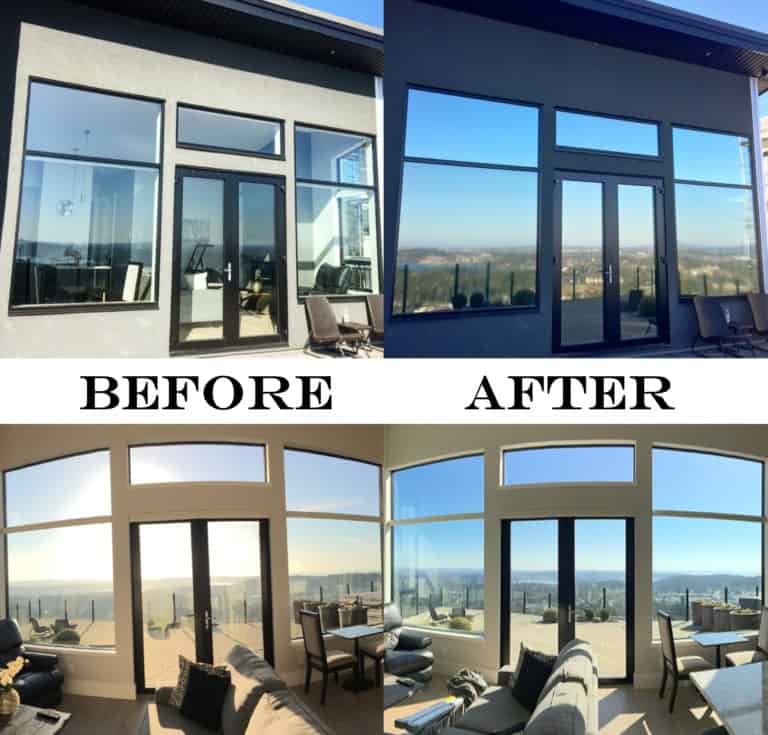Just How Residential Window Tinting Boosts Your Home's Power Efficiency
Residential home window tinting provides a compelling option for homeowners looking for to improve power effectiveness within their space. By using specialized films to home windows, it successfully reduces warm transfer, thereby supporting indoor temperature levels and reducing the demand for extreme heating or cooling. This not just curtails power consumption however also gives a more comfy environment by reducing glow. Nevertheless, comprehending the subtleties of exactly how tinting jobs and selecting the appropriate kind for your home can be pivotal. Curiously, what aspects should one think about before making this investment?
Understanding Window Tinting
Understanding window tinting is necessary for house owners looking for to boost both convenience and power performance in their space. Residential Window Tint. Home window tinting involves the application of a slim movie to the inside or outside surface of glass windows. This movie can substantially regulate the quantity of sunshine and warm that goes into a home, therefore influencing indoor climate problems
There are numerous sorts of home window tinting movies readily available, each with unique residential or commercial properties. For example, dyed movies soak up solar power, while reflective movies disperse it away from the glass surface. Ceramic films use a balance of presence and warmth rejection, making them a prominent selection amongst house owners. The efficiency of window tinting is commonly measured by its Visible Light Transmission (VLT) percentage, which indicates just how much light can travel through the film.
Benefits of Energy Performance
Home window tinting not only improves appearances however additionally plays a substantial role in enhancing power performance within property areas. By minimizing heat transfer via windows, tinted movies produce a more steady indoor climate, which can lead to substantial decreases in power consumption for heating & cooling. This power efficiency equates right into lower utility costs, supplying homeowners with significant long-term cost savings.

In addition, window tinting boosts the convenience of living areas. By reducing glow and blocking dangerous UV rays, colored windows create an even more pleasant atmosphere, which can cause enhanced wellness for owners. The security against UV rays likewise aids maintain furniture and floor covering from fading, adding to the longevity of house products.
Just How Tinting Works
Tinting movies operate through a mix of advanced materials and technologies made to manage the quantity of solar energy going into a home. Largely composed of polyester, these movies commonly integrate ceramic or metallic fragments that absorb and show heat. This twin capacity permits them to substantially reduce the infiltration of ultraviolet (UV) rays and infrared radiation while permitting visible light to pass through.
The efficiency of home window tinting is measured by its solar warmth gain coefficient (SHGC), which shows exactly how much solar power is sent through the window. Reduced SHGC values are better as they represent greater heat rejection. Furthermore, home window tints can include a variety of shades, permitting property owners to tailor their visual choices while boosting power performance.
Furthermore, these movies function as an obstacle, avoiding warm loss during cooler months by mirroring indoor heat back into the home. This thermal insulation effect complements the cooling benefits gotten during warmer months, adding to a balanced indoor climate year-round. By handling solar energy effectively, property window tinting not just improves convenience however likewise plays a crucial duty in lowering power intake and decreasing utility costs.
Selecting the Right Color

There are numerous blog here types of home window movies available, including dyed, metalized, and ceramic. Ceramic films provide exceptional warmth control without compromising visibility and are extremely long lasting, making them a preferred option.
Noticeable light transmission (VLT) is an additional crucial element, as it suggests the amount of all-natural light that can travel through the tinted glass. Property owners must pick a color with a VLT that matches their lighting choices while still supplying appropriate glow decrease.
Furthermore, examining the solar heat gain coefficient (SHGC) can assist figure out exactly how well a color can block warmth from sunshine. A reduced SHGC shows far better warmth control, inevitably enhancing energy efficiency.
Setup and Maintenance Tips
Appropriate setup and maintenance are essential components in maximizing the advantages of residential window tinting. Experts additionally image source utilize specialized devices and techniques, which can improve the resilience and effectiveness of the color.
Following setup, upkeep is vital to prolong the life of the window movie. It is recommended to wait a minimum of thirty days prior to cleaning up the colored windows to permit the glue to cure completely. When cleansing, utilize a soft towel and a gentle, ammonia-free cleaner to prevent harming the movie. Avoid abrasive products that can scratch the surface.
Attending to these problems quickly can avoid more damages and preserve energy efficiency. By sticking to these installment and maintenance pointers, homeowners can guarantee their home window tinting continues to provide significant energy cost savings and comfort for years to come.
Verdict
In conclusion, domestic home window tinting serves as an efficient solution for improving power efficiency within homes. By lowering heat transfer and obstructing damaging UV rays, home window films add to decrease my website energy usage and boosted indoor convenience.
Window tinting entails the application of a thin film to the inside or outside surface of glass home windows. By reducing warm transfer via home windows, tinted films develop a more steady interior environment, which can lead to significant reductions in energy intake for home heating and cooling.The effectiveness of window tinting is determined by its solar heat gain coefficient (SHGC), which suggests exactly how much solar energy is transferred with the home window. By taking care of solar power efficiently, property home window tinting not just boosts comfort however also plays a crucial duty in lowering power consumption and lowering utility expenses.
By minimizing warm transfer and obstructing unsafe UV rays, home window movies add to lower energy consumption and improved indoor comfort.